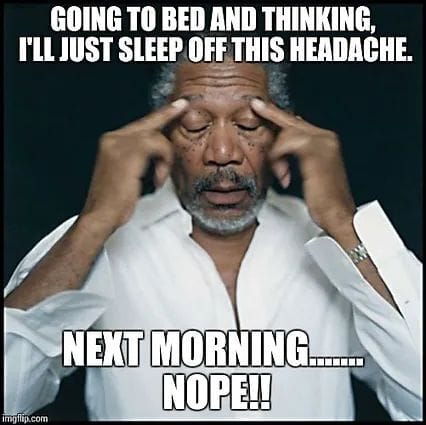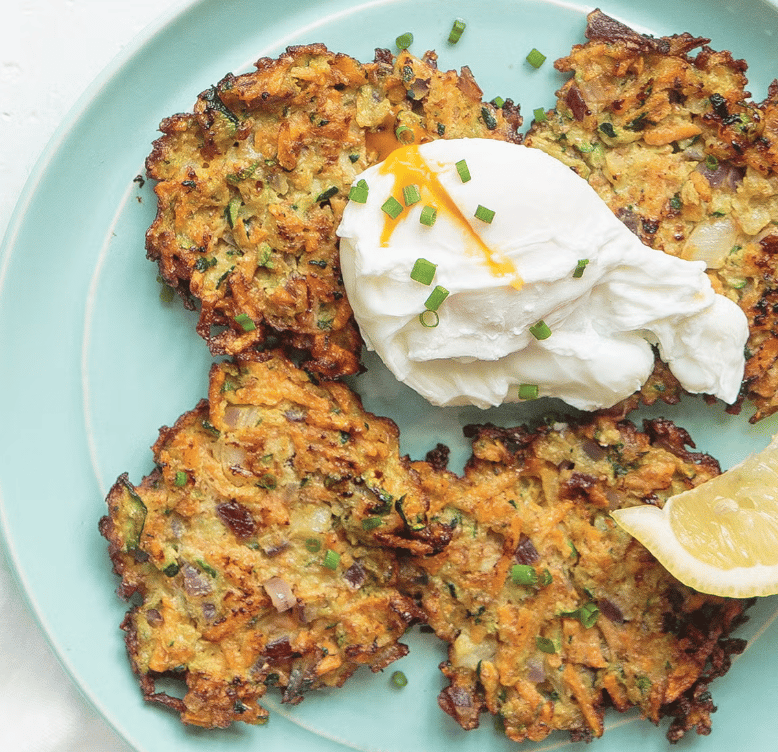- More Relief. Less Medication.
- Posts
- 🧠 How To Sleep Better With Chronic Migraines
🧠 How To Sleep Better With Chronic Migraines
When hearing "you should just sleep more" was actually what you needed...

Your hub for natural migraine management. More Relief. Less Medication.

Hey Migraine Mentees 👋
Today’s newsletter takes about 5 minutes to read—so if you’ve only got 60 seconds, here’s what you need to know:
Sleep is one of the most powerful tools for migraine prevention, pain recovery, and brain inflammation control—yet it’s often overlooked in treatment plans…
Poor sleep can trigger migraines by increasing brain excitability, raising inflammatory cytokines, and disrupting hormone balance…
Deep sleep activates your brain’s glymphatic system—a detox mechanism that clears out migraine-inducing waste like glutamate and CGRP…
Many migraine sufferers struggle with falling or staying asleep due to pain, meds, hormonal shifts, or blood sugar crashes…
Strategies like low-dose melatonin, magnesium glycinate, blue-light blocking, and pre-bed snacks can improve sleep architecture and reduce attack frequency…
This week, we’ll show you how better sleep might be the missing ingredient in your migraine recovery—and how to reclaim your rest, one night at a time.
🧠 The Migraine Mentors
First time reading?! Sign up HERE.

In This Week’s Edition…
🥡 Weekly Take-Out
Meme of The Week - 😭 When Sleep Isn’t The Answer…
📸 Weekly TikToks
Riding The Migraine Medication Train
3 Simple Steps for Less Migraine Symptoms
🔈️ The Migraine Mentors Minicast - Podcast Series
Sleep – The Most Underrated Migraine Treatment?
📜 This Week’s Top Article
How To Sleep Better With Chronic Migraines
🍴 Migraine-Friendly Recipe of the Week
Sweet Potato & Zucchini Fritters

🥡 WEEKLY TAKE-OUT
Meme of The Week

Ahhhh yes. The old “I’ll sleep this one off” strategy.

🥡 WEEKLY TIKTOKS
Riding The Migraine Medication Train
@headache_whisperer #migraine #migraines #headaches #chronicpain #Meme #MemeCut
3 Simple Steps for Less Migraine Symptoms
@drerikreis #migraine #migrainerelief #pain #vestibularmigraine #chronicinflammation #creatorsearchinsights #chronicfatigue #chronicsymptoms #chronici... See more

Hydrated Skin. Deeper Sleep. One Daily Ritual!
I used to feel dry, foggy, and drained—until I tried Pique’s Deep Hydration Protocol. This day-to-night electrolyte duo hydrates skin, calms the nervous system, and supports deep sleep. No sugar, no fillers—just results. I feel clear, radiant, and truly hydrated.

🗞️ MIGRAINE MINICAST
🎧 Sleep – The Most Underrated Migraine Treatment?
😴 You’re eating right, hydrating, tracking triggers—and still waking up with pain.
…Whyyyyyyyy?
🧠 In this week’s episode, we’re breaking down how sleep—yes, just sleep—can dramatically change your migraine experience, especially if you’re caught in the wired-but-tired cycle.
Here’s what you’ll learn:
Why poor sleep fuels neuro-inflammation, CGRP surges, and migraine sensitivity…
What the glymphatic system is—and how deep sleep detoxes your brain…
How blood sugar, melatonin, and blue light affect your ability to fall and stay asleep…
7 actionable ways to improve sleep quality (and lower your next migraine risk)…
💤 Whether you struggle with falling asleep, waking up exhausted, or feel like pain ruins your rest—this episode is for you.
🎯 Tune in to learn how to reclaim sleep as a tool—not a mystery—for migraine recovery.
👇 Tap below to listen now! 👇

📜 TOP ARTICLE
💤 How To Sleep Better With Chronic Migraines
If you’re doing “everything right”—eating clean, staying hydrated, tracking triggers—but still waking up with migraine pain…
It might be time to focus on one of the most overlooked healing tools we all have access to:
🛌 Sleep.
Sleep isn’t just rest—it’s repair. And for migraine sufferers, it’s often the make-or-break factor between recovery and relapse.
But here’s the challenge: Many migraineurs can’t sleep…
Not well, not consistently, and not deeply enough to restore brain function and reset inflammatory pathways.
Let’s explore why—and what you can do about it.
🧠 Why Sleep Matters for Migraine Recovery
It Acts As a “Neural Reset” & Improves Glymphatic Drainage
During deep sleep, your brain activates its “waste clearance” system—the glymphatic pathway—to flush out neurotoxins and inflammatory byproducts. Without adequate sleep, this system backs up, and inflammation lingers, further provoking symptoms.
It Regulates Cortical Hyperexcitability & Unstable Neuronal Pathways
Sleep helps recalibrate your brain’s electrical thresholds, which is something we’ve spoken about in the past (think leaking of ions across membranes), and why electrolytes are such an important factor for finding relief. Poor sleep increases cortical excitability, making your brain more sensitive to light, sound, and internal stress—prime migraine triggers.
Sleep Restores Hormonal and Neurochemical Balance
Melatonin, serotonin, cortisol, and orexin all influence sleep architecture and pain processing. Sleep disruptions throw these systems off balance, increasing the likelihood and severity of attacks, along with a host of other health issues like blood sugar instability, stress intolerance, emotional instability, and inflammation.
It Optimizes Immune & Inflammatory Control
Sleep loss = systemic inflammation. In migraine patients, this exacerbates cytokine surges, histamine imbalances, and CGRP activity—hallmarks of chronic migraine pathology.
🚫 Why Migraine Makes Sleep So Hard
Here’s the cruel cycle:
Pain keeps you up
Poor sleep sensitizes your brain
Sensitized brain leads to more migraines
More migraines mean… less sleep
Other contributing factors include:
Medication side effects (especially SSRIs, triptans, steroids)
Hormonal changes (perimenopause, cycle shifts)
Blood sugar dysregulation (nighttime hypoglycemia)
Postdrome symptoms (like fatigue, dizziness, or nausea disrupting normal rhythms)
It’s hard to get away from this…
And it’s never as easy as saying “you should get more sleep”, because if that were the case, you would have already figured it out!
With that being said, you aren’t powerless…
Sleep Habits are the best way to optimize your sleep and regain control of your life.
🛠 7 Tools to Improve Sleep & Support Migraine Recovery
1. Support Melatonin Naturally 🛏️
Dim lights after sunset, block blue light, and expose your eyes to natural morning sunlight.
For some, a low-dose melatonin supplement (0.3–1 mg) may help reset rhythms without grogginess, but be careful with higher doses, as they’ve been shown to be ineffective for improving sleep.
2. Balance Blood Sugar Before Bed ⚖️
A small protein + fat snack (e.g., almond butter on a rice cake or hard-boiled egg with avocado) can prevent nocturnal drops that trigger cortisol and adrenaline spikes, if provided at the appropriate times before bed.
3. Stabilize Magnesium & B Vitamin Levels 💊
Magnesium glycinate or threonate (200–400 mg) and B2/B6/B9/B12 can calm the nervous system and improve sleep quality, especially in those with migraines tied to metabolic dysfunction.
Since most migraine sufferers are deficient in these vitamins and minerals, it’s important to always keep this top of mind.
4. Cool Down Your Core 🧊
Sleep onset requires a slight drop in core body temperature. As paradoxical as this may sound, a warm shower followed by a cool bedroom (65–67°F) can help accelerate this process and help you achieve deep sleep faster.
5. Time Your Caffeine & Screen Use ☕️
Cut caffeine after 12 PM, and avoid screens for at least 60-90 minutes before bed. Even low-level blue light can suppress melatonin and delay sleep, which is why blue blockers can be helpful if you “need” to be on your devices late into the evening.
6. Try a Wind-Down Routine 🌪️
Evening routines that include breath work, mindfulness, gentle stretching, journaling, or a calming audiobook help signal your brain that it’s time to shift into parasympathetic rest mode. It’s best to do this outside of your bed so your brain associates sleep with your bed, not anything else.
7. Track Sleep Cycles & Recovery ⌚️
Use a wearable (like an Oura Ring or WHOOP) to track your HRV, sleep latency, and sleep stages—helpful biofeedback for long-term migraine resilience. You should also know that this data isn’t always accurate, so be careful with interpreting findings that may or may not be there…
It’s up to you to implement these tools and habits, taking note that it can take days, weeks, and sometimes months to see the benefits.
Stay patient, keep reading, and know that good things are on their way!
🧠 The Migraine Mentors

🍴MIGRAINE-FRIENDLY RECIPE
Sweet Potato & Zucchini Fritters

🗒️ Ingredients
1 medium sweet potato, peeled and grated
1 small zucchini, grated (squeeze out excess water with a towel)
1 egg (or flax egg for egg sensitivity)
2 tablespoons oat flour (or any low-histamine flour)
1/2 teaspoon sea salt
1/4 teaspoon garlic powder (optional, if tolerated)
Olive oil for pan frying
🌿 Optional Topping
Plain Greek yogurt (choose a fresh, unflavored variety)
Chopped parsley or chives for garnish
✅ Directions
In a mixing bowl, combine grated sweet potato, zucchini, egg, oat flour, salt, and garlic powder.
Mix well to form a thick batter.
Heat a few tablespoons of olive oil in a skillet over medium heat.
Spoon about 2 tablespoons of the mixture per fritter into the pan. Flatten gently.
Cook 3–4 minutes on each side, or until golden brown and cooked through.
Drain on paper towel. Serve warm with a dollop of Greek yogurt.
📊 Why This Recipe Is Migraine & Histamine Friendly
Low in Histamine
All ingredients are fresh and low in histamine. Sweet potatoes and zucchini are generally well-tolerated. The recipe avoids aged, fermented, or processed foods that often spike histamine.
Free from Common Triggers
No cheese, citrus, processed meats, or preservatives. It’s a clean, whole-food recipe.
Customizable
You can easily make it egg-free or dairy-free if those are personal triggers.
🩸 Blood Sugar Benefits
Low-Glycemic Ingredients
Sweet potato provides slow-digesting carbohydrates, keeping blood sugar stable and reducing energy crashes that can contribute to migraine onset.
Balanced with Fiber & Fat
Zucchini adds fiber, while olive oil provides healthy fat—both help reduce post-meal blood sugar spikes.

How did you like this week's email? |
